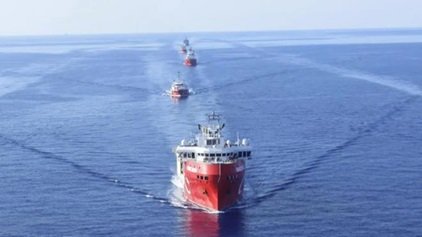By Mohamed Abdiwahid Abdullahi
A nation, with a long history of conflict, political instability, and economic trials, Somalia stands on the threshold of a transformative opportunity: oil exploration. With prospects of having vast untapped hydrocarbon reserves, both off and onshore, the east African nation could leverage its natural resources to propel economic growth and stability. Be as it may, this prospect carries with it significant international and domestic implications. If managed effectively, oil revenues could help Somalia significantly improve its infrastructure, bolster its governance, and augment regional cooperation. However, mismanagement, corruption, and external interference could aggravate existing tensions and lead to further instability. We’ll explore the future of oil exploration in Somalia, its benefits, the necessary precautions the state must undergo, and the larger geopolitical ramifications.
Oil exploration in Somalia has significant transformative implications for the country’s economic landscape. Being one of the poorest nations in the world, with a GDP of 11.68 billion USD (World Bank, 2023); to put into perspective, that is lower than the small state of Vermont, USA– oil revenues would generate significate revenues, allowing the government and private companies to fund infrastructure projects, improve healthcare and expand education – creating employment opportunities for citizens all around. Such an influx of capital would also bolster the Somali shilling and stabilize the county’s financial institution – increasing its buying power as well.
In an article aptly titled, “Beware of Strike-it-Rich Euphoria: the Curse of Potential Oil Wealth” (IMF, 2018), it discusses how the mismanagement of revenue from Oil extracts can prove detrimental to the overall political and economic health of a nation. Economist James Cust, of the World Bank highlighted how countries, who are found to have rich natural resources often overborrow and overspend prior to having sufficient returns on their assets. Case studies, particularly that of Ghana, borrowed roughly 4.5 billion dollars from investors, corporations, and other financial institutions, yet saved about $500 million from its oil revenues. Oil prices crashed in 2014, subsequently hurting the Ghanaian economy. Tanzania, however, exercised more restraint in borrowing, and spending, thus making its economy more resilient to the price crash.
Oil wealth must be equitably distributed across all sectors and regions of the country to thwart any possible emergence of local tensions. With a long standing tradition of clan and tribal based dynamics, any inappropriate disbursement of capital could spark inter-clan rivalries furthering any existing apprehensions. Establishing a fair and equitable national policy for resource management must be at the forefront of such discussions with the goal of forging unification amongst its people.
In March of 2024, Turkey and Somalia signed an agreement to explore for oil and natural gas. The Turkish research vessel “Oruc Reis” had arrived at the port of Mogadishu to begin its oceanic seismic survey, covering approximately 5000 square kilometers. Research is expected to continue between 5 to 7 months upon its arrival.
Maritime security is another important consideration. Somali waters are still vulnerable to piracy, and the presence of oil exploration operations may attract criminal enterprises wiling to sabotage these projects, or demand ransoms. Somalia, therefore must strengthen their naval capabilities, and collaborate closely with foreign partners, namely Turkey.
Somalia, if prospects are promising, now has rare opportunity to alter its future political and economic standing through untapped reserves nestled deep within it’s seafloor. This nation could overcome a long history of uncertainty, destruction and dismay transforming it into a more successful and – most of all – independent economy where it may now export more than it imports. However, this is predicated on sound and accurate estimates by oil explorers, investors and the government.
The recompenses of oil prosperity are not always assured or guaranteed as history has shown in many other resource-rich nations; mismanagement, corruption and external interventions could pressurize already tattered and fragile relations locally and regionally.
Somalia should heed the nuanced approaches from nations like Ghana and Tanzania, establish open and fair revenue management system in order to prosper. Somalia must abstain from taking on more debt than it can handle, mend interclan relations, and invest in governance, national security, and infrastructure as part of a resolute package to positively transform this jewel of the Horn of Africa.
Mohamed Abdiwahid Abdullahi
Email: AbdullahiM@tiffin.edu
—–
Mohamed is a writer and academic, holds a Master’s degree in Creative Writing. He has authored numerous academic papers exploring topics such as challenges in the humanities, neocolonialism, teaching philosophies, and other scholarly fields.
References:
“Beware of Strike-IT-Rich Euphoria: The Curse of Potential Oil Wealth.” IMF, International Monetary Fund, 9 Mar. 2018, www.imf.org/en/Blogs/Articles/2018/03/09/beware-of-strike-it-rich-euphoria-the-curse-of-potential-oil-wealth.
“Overview.” World Bank, 23 Oct. 2024, www.worldbank.org/en/country/somalia/overview.
“Turkey’s TPAO, Somalia’s Petrol Authority Sign Onshore Exploration Deal | Reuters.” Turkey’s TPAO, Somalia’s Petrol Authority Sign Onshore Exploration Deal, Reuters, 25 Oct. 2024, www.reuters.com/business/energy/turkeys-tpao-somalias-petrol-authority-sign-onshore-exploration-deal-2024-10-25/.
Image source: “Türkiye’s Research Ship Arrives in Somalia for Oil, Gas Exploration – Latest News.” Hürriyet Daily News, Hürriyet Daily News, 25 Oct. 2024, www.hurriyetdailynews


Leave a Reply